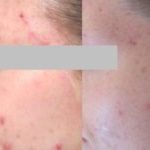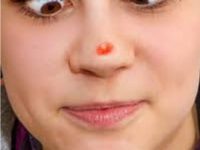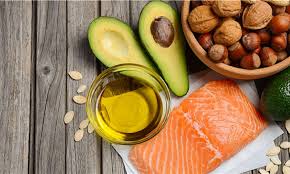What is Acne & Acne Scars
February 21, 2019
Tips for Acne Prevention and Healing
March 21, 2019[av_textblock size=” av-medium-font-size=” av-small-font-size=” av-mini-font-size=” font_color=” color=” id=” custom_class=” template_class=” av_uid=’av-l2fkf44x’ sc_version=’1.0′ admin_preview_bg=”] 1.) Acne and Hormonal Imbalance Acne is often described as a disease involving the sebaceous follicles and hair follicles of the skin. It occurs in people who have a genetic predisposition; if acne runs in the families of both parents, three out of four children may suffer from it. Acne can occur at any stage of our lifespan. The primary aggravating factor leading to adult acne is chronic stress. Unfortunately, not only teenagers suffer from acne because of fluctuation of hormones, but adults too can have breakouts, especially women. One reason why adult acne is on the rise amongst the female population is because of the additional responsibilities that have increased women’s stress levels. The pressure to work outside the home to help maintain a steady family income while also maintaining a functioning household is unique to this generation of women in their 20s, 30s and 40s. Combine workplace stress with household responsibilities, cosmetics that contain known skin irritants and monthly hormone fluctuations, and you have a perfect breeding ground for the formation of adult acne. During puberty, peri-menopause and menopause, sebaceous (oil) glands become more active. Pores can become clogged with sebum, dried skin and bacteria, which causes skin to erupt into pimples, red blotches and sometimes inflamed and infected abscesses. Acne normally appears on the face, shoulders, scalp, upper arms and legs, upper chest and back. More than 40 percent of teens seek treatment from a specialist for their acne condition. Hormonal acne break-outs tend to occur during ovulation or the week before menstruation. In those women with hormonally induced acne, when the ovary releases the egg, it often is not able to completely release. When this occurs, androgens (male hormones) are secreted in excess, and women develop acne around the hair line, chin, chest and back. To correct hormonal acne, many doctors prescribe birth control pills to stop ovulation. Today it is not uncommon for children as young as 12 to be prescribed birth control pills to control acne. However, there are alternative options. Nutritional supplements can normalize ovulation and eliminate the problem at the source. Even mild episodes of acne can lead to scarring, and these scars can be both physical and psychological. Symptoms There are various types of skin lesions: a papule is a round bump that may be invisible but makes the skin feel rough like sandpaper. A comedo occurs when an oil follicle becomes plugged with oil, dead skin, tiny hairs or bacteria. An open comedo is known as a blackhead, and a closed comedo is commonly referred to as a whitehead. The temporary red or pink spot after an acne lesion has healed is referred to as a macule, and several together contribute to the appearance of inflammation associated with acne. A nodule is another dome-shaped lesion similar to a papule, but it extends deeper into the skin, causing the destruction of tissues that lead to scarring. Nodules can be painful, as can cysts, which are filled with liquid. Cysts can be severely inflamed and also affect deeper skin layers. Causes Food choices have been hotly debated as a cause of acne in teens. Research from the University of Colorado is confirming that a diet high in refined carbohydrates permanently boosts insulin and thus promotes acne. According to Dr. Loren Cordain, sustained high insulin levels elevate hormone levels, stimulating the production of oil that leads to clogged pores, bacterial growth and acne. High-glycemic foods such as breads, cakes, sugars and soda are major culprits in acne. With the shift between male hormones and female hormones during the menstrual cycle, acne lesions change. Synthetic progestins and estrogens used for menopausal symptoms, supplements of DHEA, endometriosis, polycystic ovary syndrome and estrogen dominance have been linked to acne. Other drugs such as corticosteroids, anabolic steroids, iodides and bromides are also known to cause acne, as are cosmetics that block pores. 2.) Acne and Adrenal Exhaustion (Stress) The adrenal glands get very little attention in Western medicine, yet they have the important job of secreting sex hormones and stress hormones that guide reactions to stressors throughout the entire body. We have two adrenal glands, which are comprised of two parts: the medulla and the cortex. The medulla triggers the instinctual “flight or fight” response, including the increase of blood sugar levels, the rate of breathing, cardiac output and blood flow to the brain, lungs and muscles. The cortex produces hormones that are essential in regulating excretory, immune defense, metabolic, mineral balancing and reproductive functions. The cortex also secretes corticosteroids in response to stress, and these hormones help us to cope with long-term stressors by converting protein to energy. This energy remains available long after the “flight or fight” response subsides. Adrenal exhaustion occurs when the glands wear out from the continual production of the stress hormone cortisol and can lead to Chronic Fatigue Syndrome and eventually Addison’s disease. Most importantly, adrenal exhaustion promotes hormone imbalance. The adrenal glands and the thyroid are linked. If the adrenals become stressed, the thyroid gland can produce less thyroid hormone and vice versa. Most people today, particularly women, have some degree of compromised adrenal gland function due to stress. Symptoms Extreme hot flashes and night sweats, insomnia (you go to bed but three hours later you are wide awake), environmental sensitivities, hypoglycemia, poor concentration, low energy, dizziness upon rising, irritability, nervousness or anxiety, shortness of breath, knee problems, muscle twitching, heart palpitations, sensitivity to light, digestive problems or cravings for salt, sugar, junk food or coffee. To test your adrenal gland function, rest for five minutes and then take your blood pressure. Stand up and immediately take another blood pressure reading. If the reading is lower when you are standing than when you are resting, you can suspect decreased adrenal gland function. Causes Sustained periods of high stress lead to chronic elevation of the stress hormone cortisol, which research now links to bone loss, compromised immune function, acne, chronic fatigue, exhaustion, fat accumulation, infertility and memory loss. During menopause, the workload of the adrenals also increases as these glands produce the primary of sex hormones, including estrogen. For women, particularly, those who come from a full-time job to care for their families, cortisol remains elevated in the evening when it naturally should subside to allow the onset of sleep. Call Nell Laser Clinic at 416-228-0011 to book a complementary consultation session for acne and acne scars treatments and advise.
Facial Laser Hair Removal Toronto
Skincare Clinic North York
Laser Hair Removal North York
Sun Spots Removal Toronto
Dark Spots Removal Toronto
Facial Skin Treatments Toronto
Facial Skin Treatments Toronto
micro-needling toronto
Chemical Peel Toronto
CoolSculpting fat reduction Toronto
Laser Spider Veins Removal Toronto
Facial laser hair removal Toronto
[/av_textblock]Related posts
July 26, 2019




